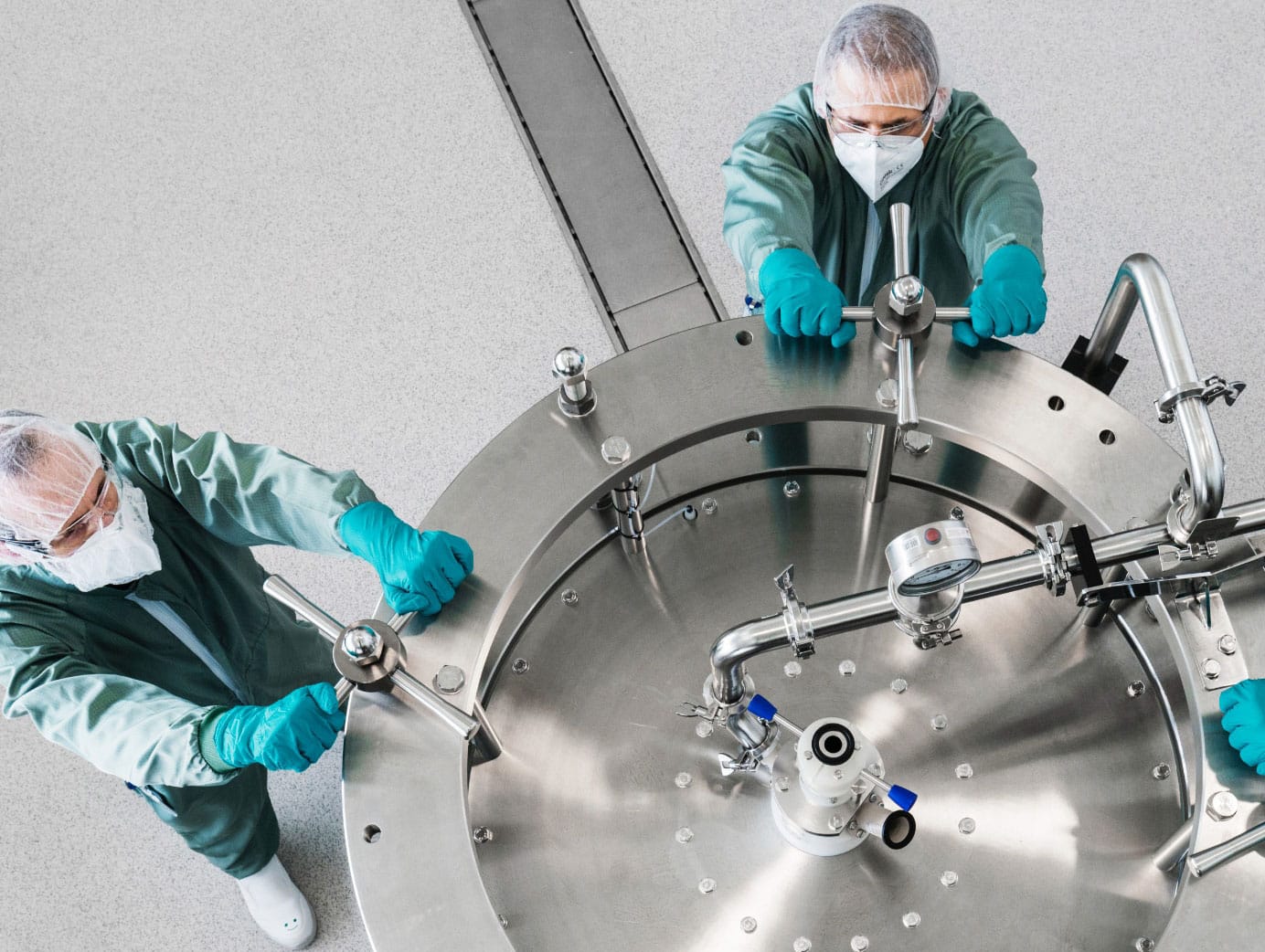Image: Boehringer Ingelheim
Process Technicians operate and monitor chemical or biochemical manufacturing processes, especially continuous flow ones on an industrial scale to turn raw materials such as milk, oil or natural gas (using heat, cold, pressure, or a chemical agent) into an end product (e.g. butter, beer, milk formula, drugs, vaccines, paint, etc.). Process technicians typically have some training in chemical engineering or chemistry.
In summary, think of it as making liquids, gases, powders or solids that have to be mixed, cooked, or fermented from a formula or recipe but on an industrial scale.
As such, process technicians generally work in the following sectors:
- Food and dairy
- Beer and whiskey manufacturing
- Chemical and petrochemical manufacturing
- Plastic manufacturing
- Agriculture processing
- Cosmetics
- Pharmaceutical and biopharmaceutical manufacturing
- Water treatment
- Mining and mineral processing (may be referred to as metallurgical/mineral process technicians
According to the BLS 2022 report on chemical plant and system operators, the median average wage $39.75 per hour and the median average salary of $82,670 per year.
Entry-level salaries range from €35,000 – €45,000 plus overtime, bonuses and allowances. (Based on Morgan McKinley Irish Salary Calculator)
BTW, if you are interested in a career in the Pharmaceutical or Medtech industries or are considering upskilling for a better job or a promotion, check out our range of pharmaceutical courses.
Process Technician vs Manufacturing Technician
Process technicians work in manufacturing with the end result that their job often gets conflated, mixed up, or confused with that of manufacturing technicians.
Let’s take a look at the difference.
Process Technicians work in Process or Continuous Flow Manufacturing – take a formulation or recipe of ingredients and use processes such as a chemical or biochemical reaction, drying, refrigeration, mixing, fluidization, crushing, pulverization, screening, sieving, fermentation, distillation, separation, crystallization, evaporation, gas absorption, filtration, polymerization, isomerization, homogenization, pasteurization, etc continuously or in a batch, to make a final product which is usually a liquid, powder, gas or solid.
Think turning milk into baby formula, oil refining, gasoline, general anesthetic, plastic, cheese, butter, paint or pharmaceutical or vaccine manufacturing,)
In a process manufacturing plant, you typically find, lots of pipes, tanks, pumps, flow valves, steam valves, temperature gauges, boilers, vessels, reactor vessels, receiver/head tanks, silos, crackers, distillation columns, heat exchangers, boilers, steam pipes, autoclaves, clarifiers, decanters, fluidised dryers, sieves, Program Logic Controllers (PLCs) PID (Proportional Integral Derivative) Controllers, conveyor belts, etc,
Manufacturing Technicians work in Discrete Manufacturing – This uses (non-chemical or non-biochemical) processes such as melting, casting, rolling, forging, milling, turning (on a lathe), sawing, electrical discharge machining, laser, abrasive water jet or plasma cutting, grinding, shearing, punching, stamping, machine pressing, extruding, drawing (wire), injection moulding, assembling, bolting, screwing, welding, riveting and gluing individual pieces into a distinct product often on an assembly line.
Think car assembly – Tesla’s production line for electric cars, shipbuilding, cellphones, computers, airplanes, syringes, medical pumps, scalpels, pacemakers, etc.
In a discrete manufacturing plant, you typically find, assembly lines, U-shaped assembly areas, machine tools, CNC machine centers, robots, welders, pick and place robots, injection moulding machines, packing machines, air-powered assembly tools, painting and finishing areas, etc.
However: There can be overlap and collaboration between these roles, and specific responsibilities may vary depending on the company and industry.
Watch this Video of a Process Technician’s Role!
For a look at the role of a Process Technician as described by someone actually on the job, check out this video from the About Bioscience website, produced by the North Carolina Association for Biomedical Research
What Does a Process Technician Do?
A Process Technician will be responsible for specific steps in:
- the processing of liquids, powders and gases in reactors, distillation columns, etc
- moved by pumps, gravity or pressure through pipes or a fluidised bed, etc
- stored in tanks and vessels
- controlled by valves
- resulting in significantly different chemical properties of the raw material compared to the final product
- either continuously in high-volume (oil or gas refining) or smaller-volume batch manufacturing (drugs, vaccines).
As a result, process technicians must know the chemical manufacturing process in detail as they will be responsible for identifying when it is deviating from the norm and taking action to correct it or involve senior members of staff if/when they are not able to correct the problem.
Here are some typical responsibilities;
- Operate the control room for large industrial plants or refineries and monitor the output of the process
- Operate complex plant machinery and/or use software to run computer-operated processes on the factory floor
- Start up, monitor or shut down plant equipment (reactors, distillation columns, valves, compressors, pumps, heat exchangers, etc) or other machinery
- Read and monitor flow meters and temperature and pressure gauges, etc and take routine readings on process variables and material properties within the process such as density, viscosity, particle-size distribution, flow rates, pressures, pH levels, cell count (in biomanufacturing) and temperatures and make adjustments when required
- Collect product samples for laboratory testing
- Measure and weigh materials
- Mix chemical reagents
- Clean spills
- Sterilise equipment
- Perform inspection, cleaning, and maintenance of the equipment in accordance with operational instructions.
- Quickly diagnose and troubleshoot routine or minor problems
- Monitor the performance of plant equipment and process conditions and report when major maintenance or repairs are necessary.
- Involve senior staff in more complex problems
- Regularly review the production schedule
- Strictly follow the internal protocols and standard operating procedures (SOPs)
- Strictly follow external regulations such as current Good Manufacturing Practices (cGMP) when working in the pharmaceutical and medical device manufacturing industry
- Maintain accurate and clear documentation such as batch logs
- Gathering data from their process and reporting it to senior staff members (typically a Process Engineer or Production Manager
There is a large amount of responsibility given to individuals within these roles. Any deviation from these practices or any mistake made could have serious repercussions, resulting in potentially unsafe defective products or expensive destruction of batches.
Process Technician vs Process Operator
We also see “Process Operator” to describe an entry-level version of this role where they place heavy emphasis on strictly following processes, procedures and systems so you generally wouldn’t need a chemistry, engineering or science background.
Some companies call this role:
- Process Operative
- Chemical Process Operator
- Chemical Plant and System Operator
- BioProcess Operator
- BioProcess Manufacturing Operator
- Cleanroom Operator
A high school/secondary school or equivalent qualification along with the right aptitude and skills is sufficient. Employers typically provide the training needed to complete the tasks specific to each job role as necessary.
Entry-level salaries range from €30,000 – €4o,000 plus overtime, bonuses and shift allowances (up to 30% extra). (Based on Morgan McKinley Irish Salary Calculator)
Working as a Process Technician
Process Technicians may spend a lot of time at a control desk in a large industrial plant or they could always be on their feet on the industrial plant floor. Even when they are operating or monitoring a machine, they are still standing and alert. Many work in controlled environments with restricted access.
Process Technicians can work:
- outside, (petrochemicals, oil refineries, fertilizer manufacturing)
- within a hygienic environment (food & beverage, beer, cheese)
- within a cleanroom environment (pharmaceutical, biopharmaceutical or medical device manufacturing)
In some cases, the role may require a high degree of manual dexterity as the job might require switching out pipes, plant or machinery when changing from one product run to another within the facility.
Depending on the environment, personal protective gear (including masks, cleanroom gowns, clothing, footwear, and gloves) is required. This is both for their own safety and to maintain the integrity of the product by avoiding contamination.
In biopharmaceutical manufacturing, processes technicians could work in:
- Upstream operations – stages of biopharmaceutical processing up to the cell culture or fermentation process that is used to make the target proteins
- Downstream operations – stages of processing that come after cell culture or fermentation. These stages include separation and purification to achieve the required drug product
- Manufacturing, science & technology (MSAT) – support operations with activities such as continuous process improvement, implementing new technologies and troubleshooting
- Fill finish/packaging – final stages of the manufacturing process where the active agent is prepared into its final form, before being filled and sealed within containers.
Process Technician Salaries
In the UK, the basic entry-level salary for a Process Technician is £25,870
Reference: Office of National Statistics
According to the BLS 2022 report on chemical plant and system operators, the median average wage $39.75 per hour and the median average salary of $82,670 per year.
Entry-level salaries range from €35,000 – €45,000 plus overtime, bonuses and allowances. (Based on Morgan McKinley Irish Salary Calculator)
Check out our salary guide for Process Technician salaries for more details.
How Do You Become a Process Technician?
Most process technician roles would typically require some training in chemical engineering or relevant chemistry or biochemistry qualification. This could be an associate degree/diploma in chemical/process engineering, science or a related field or vocational training through an accredited institution.
However, this is not an absolute requirement. We have come across companies that hire people as process operators, invest time and money in building up their responsibilities to that of a process technician and even pay for them to go to university to become chemical/process engineers.
Here is an example of a typical curriculum taken from University College Cork in Ireland or a process and chemical engineering diploma.
- Introduction to Chemical Processing Engineering
- Material and Energy Balances
- Fluid Mechanics and Particle Processing
- Heat Transfer and Applied Thermodynamics
- Mass Transfer and Separation Processes
- Process Control and Equipment Integrity
- Process Optimisation and Occupational Health and Safety
- Environmental Engineering and Safety
- Reaction Engineering and Unit Operations
- Process and Plant Design
- Chemical Engineering Project
How Do You Become a Process Technician in Pharmaceutical Manufacturing?
If you’d like to retrain for a process technician role within the pharmaceutical manufacturing sector, check out the following steps;
STEP 1: take this Conversion Course into Pharma to retrain for starter-level roles such as:
- Process Operator. Some companies call this role:
- Cleanroom Operator
- Chemical Plant and System Operator
- Chemical Process Operator
STEP 2: If you want to progress your career beyond a starter role and beyond, then take our Certificate in eBioPharmachem program to get a level 7 university qualification from the Technology University Dublin, Ireland and get better jobs with a higher salary. Typical roles;
- Process Technician
- Chemical Process Technician,
- BioProcess Technician
And with more experience:
What Skills Do I Need?
The ideal skill set for someone moving into a Process Technician role includes:
- Chemistry or chemical engineering knowledge – you generally need some chemistry or chemical engineering knowledge although the amount is heavily sector-dependent and in some cases, may be learnt on the job. For example:
- plant design and commissioning
- phase equilibrium and mass transfer
- biochemical engineering
- industrial chemistry
- organic chemistry
- cell biology
- reactor design
- chemical reaction engineering
- process dynamics and control
- chemical process equipment
- unit operations and particle technology
- Be able to read and interpret technical drawings, especially P&IDs and pipe skids
- Systems analysis and evaluation
- Good at gathering information through observation
- Attention to detail – there are often many steps involved in a process, must be familiar with the details of each. Must follow SOPs closely and must observe all features of the clean room environment thoroughly
- Alert – must be able to quickly identify when the process is deviating from the norm
- Calm under pressure – must be able to confidently address problems if they arise, take appropriate action and involve others when needed
- Numerical skills – there can be formulas to follow and numerical factors to consider when following protocols and procedures
- Good communication skills – written skills are important to ensure clear documentation and verbal and listening skills are important to ensure efficient transfer of information between staff members (keeping in mind that these might be high-pressure situations when troubleshooting problems)
- Good computer skills – much of the documentation of processes is done via computer systems
Process Technician Resume Tips
For more information on currently available Process Technician roles, head to our pharmaceutical jobs board for Ireland and our pharmaceutical jobs board for the UK and select Production/Manufacturing in the “Jobs by Category” menu.
24 Other Types of Job Roles in Pharma
Manufacturing/Production
- Process Technician
- Process Operator
- Manufacturing Technician
- Production Operator
- Packaging Operator
- Production Supervisor
Engineering
- Process Engineer
- Manufacturing Engineer
- Instrumentation Engineer
- Project Engineer
- Automation Engineer
Maintenance
Quality
Science/Laboratory
Validation
Our Most Popular Programs and Courses
- Equipment Validation Training Course – for Starter Validation, CQV and C&Q Roles
- Pharmaceutical Validation Training Course – for more Senior Validation, CQV and C&Q Roles
- Computer System Validation (CSV) Course
- GMP Training for the Pharmaceutical Industry
- View All 13 Pharmaceutical Industry Training Courses
About the Author
Donagh Fitzgerald
Head of Marketing & Product Development
Mechanical/Production Engineer
Donagh looks after the marketing and product development including the training and pedagogical elements of our programs and makes sure that all GetReskilled’s users can have a great online learning experience. Donagh has lived and worked in many countries including Ireland, America, the UK, Singapore, Hong Kong and Japan. Donagh has also served as the Program Manager for the Farmleigh Fellowship based out of Singapore.
Donagh holds Degrees in Production Engineering and Mechanical Engineering from South East Technological University, Ireland.
Claire Wilson
Content Marketing and Career Coaching
Claire runs GetReskilled’s Advanced Career Coaching Programme – our specially devised job hunting course that helps our trainees take that final step into employment by leading them through the job hunting process. She is extremely enthusiastic about helping people reach their final goal of employment in their new career path.
Claire has a BSc (Hons) in Medical Biology from Edinburgh University and spent 7 years working in the pharmaceutical and medical device industries.



Feelling really impress and its one of my desired job in my life.